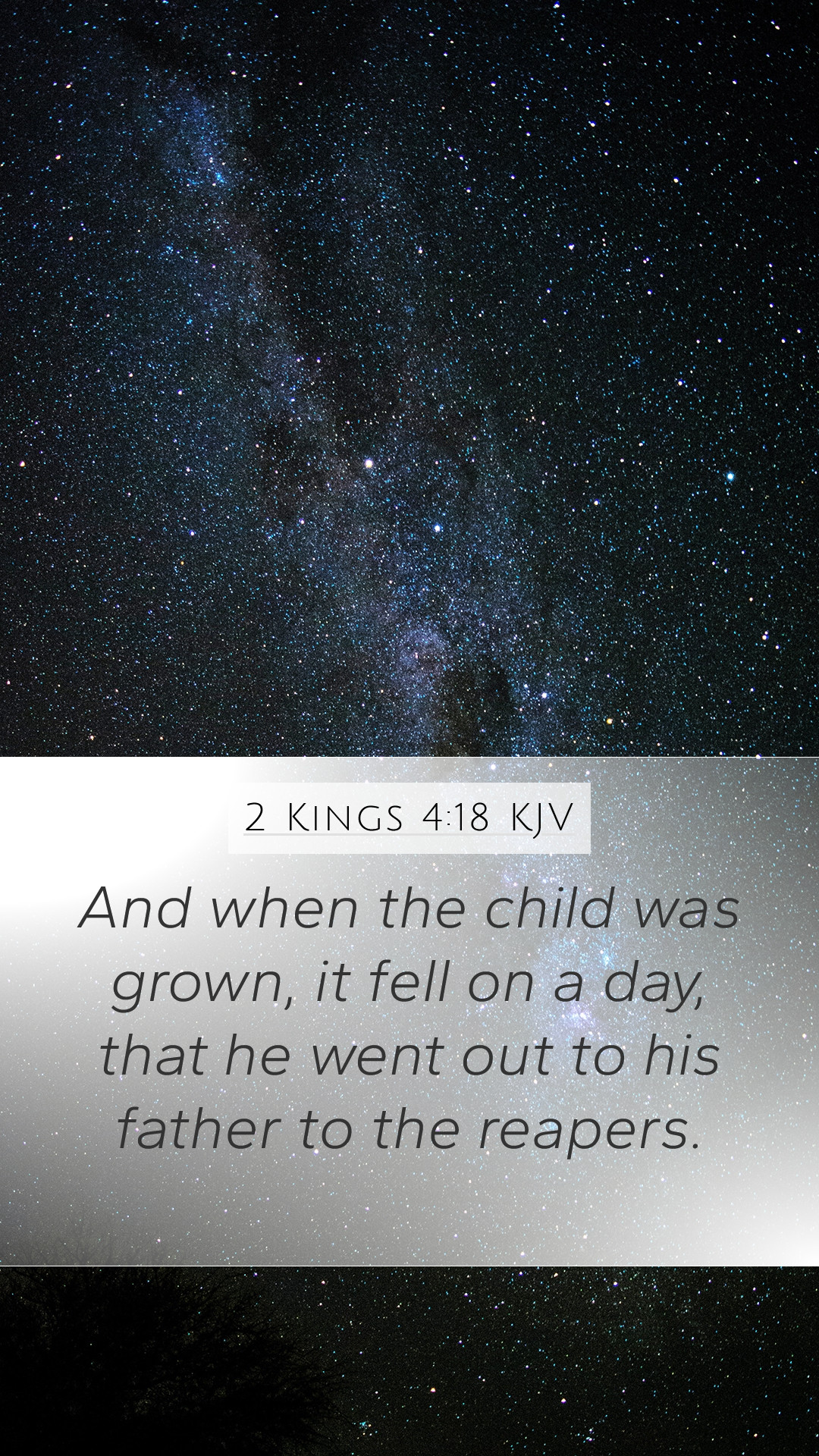Bible Verse Meaning: 2 Kings 4:18
Verse: 2 Kings 4:18
In 2 Kings 4:18, we encounter a profound narrative that emphasizes the relationships between faith, divine intervention, and human experiences. This verse plays a critical role in the story of the Shunammite woman, whose life is intricately woven with the prophet Elisha's mission and miracles.
Summary of the Verse
This verse states that the Shunammite woman has a son, and as he grows, he experiences a day that turns tragic. He complains of a headache, which leads to his untimely death. This poignant moment serves as a catalyst for a deeper exploration of the verse's meaning and significance.
Commentary Insights
- Matthew Henry's Commentary:
Henry emphasizes the emotional weight of the story, noting the joys and sorrows of the Shunammite woman as she navigates the challenges of motherhood. He points out that this verse illustrates the unpredictable nature of life and reminds the readers that even those blessed with divine gifts may face profound trials. Henry interprets the child’s affliction not merely as a physical ailment but as a representation of the heart’s burden when facing loss.
- Albert Barnes' Notes:
Barnes provides a more contextual understanding, linking the event to the overall narrative of Elisha's prophetic ministry. He highlights the significance of divine grace in the woman's life and the miracle of childbirth at her older age. Barnes asserts that this incident showcases God’s timing and the lessons of faith and trust in the face of adversity.
- Adam Clarke's Commentary:
Clarke delves into the details surrounding the child’s condition, analyzing the physical and emotional aspects experienced by the mother. He offers insights into the customs and beliefs of the time, especially regarding health and healing. Clarke also reflects on the emotional devastation the woman faces, emphasizing her unwavering faith and resilience as she responds to her son's illness.
Understanding the Themes
This verse is rich in themes that offer deep insights into human experience and divinity:
- The Nature of Faith: The Shunammite woman's faith is evident throughout the narrative. Despite the impending loss, she demonstrates trust in God and the prophet Elisha, symbolizing the need for unwavering faith amid trials.
- The Complexity of Life: The juxtaposition of joy (the birth of her son) against calamity (his death) highlights the unpredictable nature of existence, reminding believers of the need for comfort and solace in God during difficult times.
- Divine Intervention: The story serves to show that God is active in human affairs, often turning despair into hope through miraculous acts. The Shunammite woman's insistence on seeking Elisha reflects her belief in divine intervention.
Application of the Verse
As we analyze 2 Kings 4:18, we can draw various applications for modern believers:
- Trust in Times of Trouble: Just as the Shunammite woman reached out to Elisha, modern readers are encouraged to maintain faith and seek the help of God and their community during hardships.
- Emotional Resilience: This verse illustrates the journey through grief and loss. Believers can find comfort in knowing that vulnerability is natural, and turning to God in sorrow is a sign of strength.
- Importance of Relationships: The bond between the Shunammite woman and Elisha illustrates the strength found in supportive relationships. Modern believers can find value in nurturing connections within their community during trials.
Cross References
2 Kings 4:18 is related to several other Bible passages that enhance its understanding:
- 1 Kings 17:17-24 – Elijah raises the widow's son.
- 2 Kings 4:1-7 – The story of the widow's oil.
- 2 Kings 4:32-37 – Elisha raises the Shunammite woman's son.
Conclusion
2 Kings 4:18 provides profound insights into the complexities of life, faith, and divine mercy. As we explore this scripture through verse commentary, biblical exegesis, and scripture analysis, we deepen our understanding and appreciation for the lessons present in these narratives. Engaging in Bible study on passages like this encourages growth in faith and provides essential biblical study insights for navigating life’s challenges.


